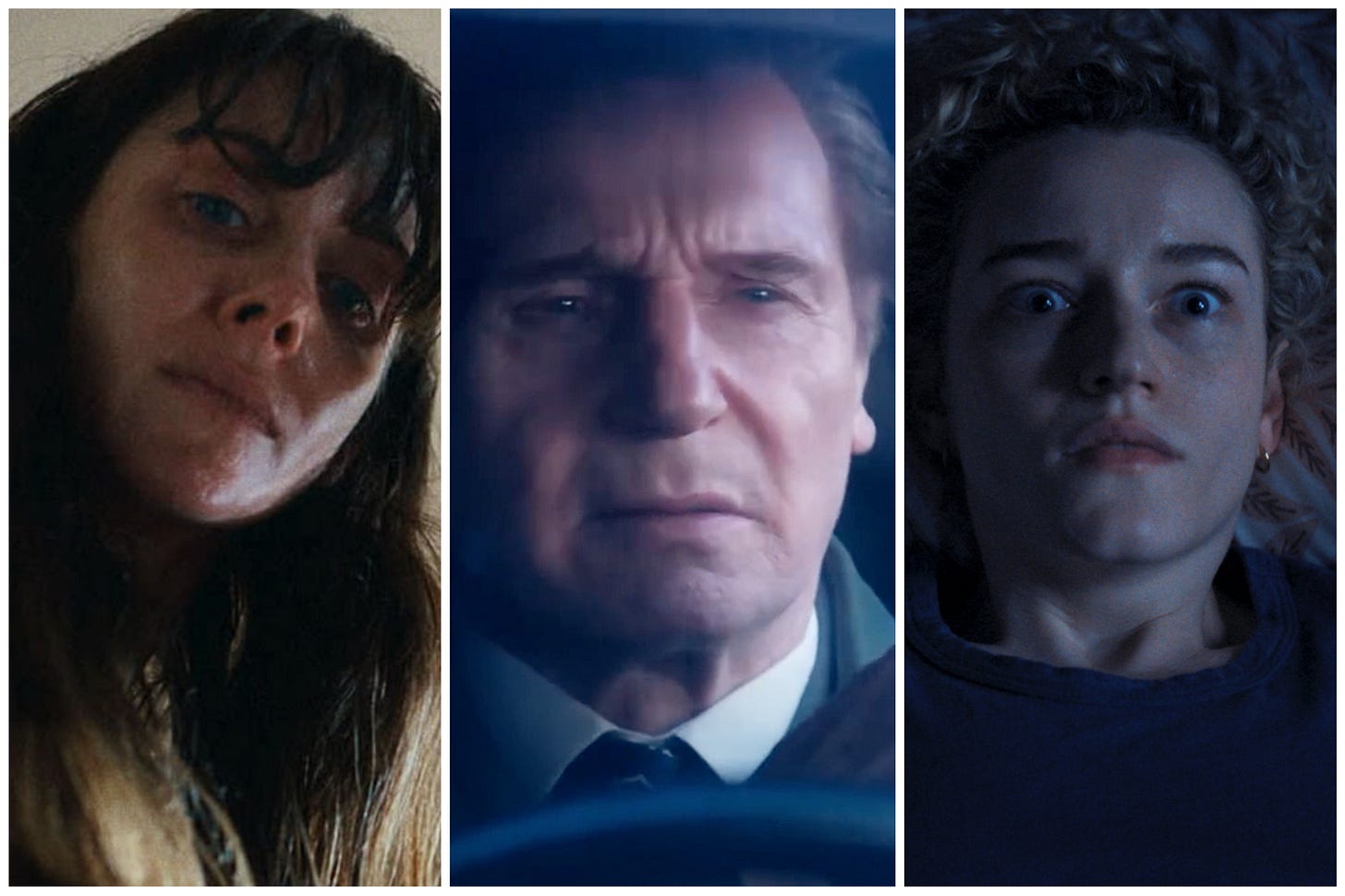Cinema Year '25: August
The Naked Gun / Weapons / Together
Welcome back to Cinema Year ‘25, a monthly review supplement. August’s new releases used the trappings of genre to wrestle with contemporary fetish. You could even say they were elevated. Words by Kirsty Asher, Ben Flanagan, and Blaise Radley.
Don’t forget to subscribe to receive this and more film writing direct to your inbox.
Did you attend an interesting repertory film event this month and want to write about it? Get in touch yearzerocinema@gmail.com.
The Naked Gun (Akiva Schaffer, 2025, USA)
Bingo! A remake that respects its source material, while refusing to pander to the multiversification of contemporary Hollywood filmmaking. The latter may well be aided by Seth MacFarlane’s input as executive producer/jokewriter, since the man’s love of jazz and twentieth century pop culture gives him a cryogenic edge which evades the obvious. Akiva Schaffer, too, has good form in creating scenes of delightful silliness. Background visual humour, a key aspect of the original trilogy, is brilliantly executed. The plot device of self-driving electric cars and evil tech billionaires is enough to establish an updated evil from the original films without attempting a Black Mirror-esque corralling of the audience.
Liam Neeson was always the right man for the job—whether it be Taken (2008), his viral deadpan cameo in Life’s Too Short (2011–2013), or a combination of both which inspired the casting directors. Pamela Anderson similarly is the perfect successor to Priscilla Presley’s and Anna Nicole Smith’s breathy comedic timing, and continues to rake in the chips she has fought hard to win. Between her performance here and Sara Sampaio in Gunn’s Superman (2025), this is the summer of the triumphant blockbuster bimbo (suck it, Barbie). Like a boy approaching manhood, I can’t wait for the second one to drop. KA
Weapons (Zach Cregger, 2025, USA)
The summer’s grand blockbuster horror film, in which a class of schoolchildren flee their homes one night, begins as a vast mystery and slowly zeroes into heartbreaking character study. Its vaguely articulated suburban setting is sparsely populated to the point of paranoia. A community without care where checking in on one’s neighbour is a faux pas, while gas station confrontations are practically encouraged. In such a world the revolving character chapter structure is necessary, the obviousness of the mystery’s origins shielded only by miscommunication.
As alcoholic teacher Julia Garner and Sound of Freedom-coded Josh Brolin’s parallel investigations unfurl, there are lapses in sense—plot contrivances that would be elided in a horror film that doesn’t spend so much time attempting to draw a social system. Then there’s the cop and addict characters, between whom Cregger draws an unfortunate line in a section which resembles the Trafficio-Babel-Crashian ‘everyone is connected’ melodrama mid-00s cycle. Yet, it still comes across as more affecting than a gonzo satire like Ari Aster’s Eddington (2025), which, rightly or wrongly, sees social concerns as little more than meme culture. Cregger wields the camera in a mid-level drama pastiche, unless he’s delivering one of the film’s signature scare scenes, in which case the blocking of terror is elegant and effective.
As with Cregger’s previous Barbarian (2022), these tendencies toward liberalism suggest something more reactionary. But—whisper it—like many of the classics of the Exorcisto-Texas Chainsaw-Psychoian variety, beautiful performances and a focus on character are more central than any white-elephant elevation. Thus, gestures toward a number of North American fears, both folkloric and contemporary—the monstrous feminine, child abduction as ritual—beside gun violence, police violence, and the sheer fragmentary insanity of contemporary society, form a haunting backdrop to Weapons’ formal precision. BF
Together (Michael Shanks, 2025, USA/Australia)
Picture this: a party scene in a homely apartment that costs upwards of a million dollars. There are fairy lights, a nice couple, and a large number of cosmopolitan creatives speaking in faux naturalisms. The nice couple are both white. The nice couple are both played by recognisable Hollywood B-listers. The nice couple share a few glances that suggest they are not fucking. You suspect that he likes IPAs and gigs that finish by 11pm. You suspect that she has an artisanal hobby that lightly refutes gender norms.
You’re watching an American “indie” in 2025, and you can already tell it debuted at Sundance.
Together is not an awful movie. But it does typify how banal the independent landscape in the US has become; a conveyor belt of softly-lit post-mumblecore pish that only finds novelty in genre fusion and high concepts. In the case of Together, the aforementioned nice couple’s codependency issues are rendered physical through body horror: namely, a force that compels them toward one another, and to fuse upon contact. Does the conflict between the realism of their romantic problems and such an otherworldly horror give rise to any interesting observations about the gruesomeness of intimacy? Of course not. BR



